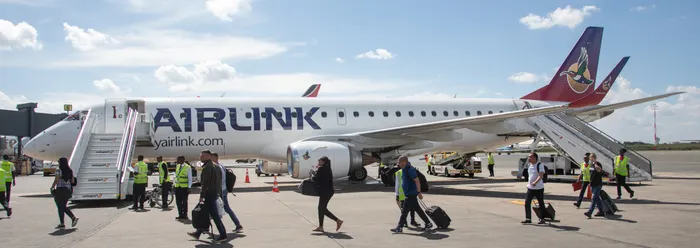Airlink defends conduct in Mthatha route case before Competition Tribunal
COMPETITION

Passengers board an Airlink aeroplane on a tarmac. The case follows a referral by the Competition Commission, based on complaints lodged between 2015 and 2017 by business executive Khwezi Tiya, the OR Tambo District Chamber of Business, and FBC itself.
Image: File photo
Regional airline Airlink has defended its operations on the Johannesburg–Mthatha route, telling the Competition Tribunal on Monday that its presence on the contested route was marked by losses, high re-establishment costs, and difficult operating conditions rather than predatory pricing.
The Tribunal this week resumed hearings into allegations that Airlink abused its dominance on the route between 2012 and 2016, when new entrant Fly Blue Crane (FBC) briefly competed before exiting the market.
The case follows a referral by the Competition Commission, based on complaints lodged between 2015 and 2017 by business executive Khwezi Tiya, the OR Tambo District Chamber of Business, and FBC itself.
The complainants accused Airlink of imposing excessive fares when it held a monopoly and then slashing prices aggressively to drive out competition once FBC entered the market.
Airlink, however, argued that its operations on the route had been far from consistently profitable.
The airline said it incurred an operating loss of R12 million on the Johannesburg–Mthatha–Johannesburg service outside the complaint period, while shouldering significant re-establishment costs.
Economic expert Anthony Felet, testifying for Airlink before the Tribunal, said the airline had faced a range of challenges, including the 2016 downgrading of Mthatha Airport, unreliable electricity and weather services, lack of runway lighting, and fuel storage shortages.
Between January 2019 and December 2022, flights were even suspended for extended periods.
He also noted that the broader airline industry had been hit hard by global shocks such as the September 11 attacks, the 2008 financial crisis, and, most severely, the Covid-19 pandemic, which forced carriers like Comair, SA Express, Mango, and the old SAA out of the market.
"Significant existential threats in the market forced out Comair, SAA the old version, SA Express and Mango. Airlink itself was experiencing threats to going concern status. They had to restructure debt and shareholders had to contribute R100 million to reaffirm and strengthen the balance sheet, indicative of the difficult operating environment of airlines across the globe," Felet said.
"It would be considered in addition to the regulator of earnings, there exists episodes in the airline industry that caused mass exit from the global airline market. To re-establish and regain confidence in schedules over time, there was a gradual increase in capacity after Covid."
According to Felet, rebuilding capacity after Covid required Airlink to absorb losses of about R28 million in the first two to three years of re-establishing the Mthatha route. He argued this was evidence of a long-term commitment to the route rather than short-term profit-taking.
"The fact that Airlink incurred losses after the complaint period indicates that they committed to the route for the long-term. At end of the period, it increased capacity and the majority of profits derived in the complaint period," he said.
Felet acknowledged that Airlink earned most of its operating profits on the route between September 2013 and August 2016, but said those gains were offset by losses outside that window.
Cumulatively, Airlink generated about R104 million in operating profits on the route, concentrated largely during the complaint period.
Responding to allegations of excessive pricing, Airlink said fares on the Johannesburg–Mthatha route rose by about 20% between September 2013 and August 2016 — equivalent to a compounded annual increase of around 6%.
A ticket costing R1 500 in 2010 would have risen by about 8% annually on a compounded basis during the disputed period, the airline said.
Felet told the Tribunal that the “fluctuating fortunes” of the route showed it was not a consistent source of profit, but one characterised by volatility.
The Competition Tribunal is hearing economic evidence following earlier testimony from factual and financial experts.
The Competition Commission has recommended that Airlink be found to have abused its dominance on the route, while the airline insists that FBC’s failure was due to inefficiencies and lack of capacity rather than anti-competitive conduct.
BUSINESS REPORT